
A team of researchers from Tehran University of Medical Sciences has found a simple and affordable way to lower the risk of serious heart problems such as heart attacks, strokes, and heart failure.
Their study focused on a pill called the “polypill,” which combines four common medications into one tablet. This new approach could make a big difference, especially in countries where medical care is expensive or hard to get.
Heart disease is the leading cause of death worldwide. It often develops over time due to factors like high blood pressure, high cholesterol, and unhealthy lifestyle habits. Many people at risk are told to take different medications to manage these conditions.
However, taking multiple pills each day can be hard to keep up with, and some people stop taking them or forget. This can increase their risk of having serious heart issues.
To make things easier and improve health outcomes, researchers created the polypill. It includes four medicines that are already widely used: two that lower blood pressure, one that lowers cholesterol, and a small amount of aspirin, which helps prevent blood clots.
These medications work together to reduce the chances of blocked arteries, which can lead to heart attacks and strokes.
The research team tested the polypill in a large study in Iran. About 6,800 people aged between 50 and 75 took part. Some of them had already experienced heart problems, while others had not. Everyone in the study was given advice on how to live a healthy lifestyle, such as eating well and exercising. However, only half of the group received the polypill to take regularly.
The pill used in the study contained 81 milligrams of aspirin, 20 milligrams of atorvastatin (a medicine to lower cholesterol), 12.5 milligrams of hydrochlorothiazide (a diuretic that helps reduce blood pressure), and 5 milligrams of enalapril (another medicine for blood pressure).
The study lasted for five years, and the results were very promising. Only 6% of the people who took the polypill experienced a major heart problem during that time. In comparison, 9% of the people who didn’t take the pill had a heart attack, stroke, or heart failure. This means that taking the polypill lowered the risk by about 34%.
Even after adjusting the numbers to account for other medications the participants might have been taking, the polypill still showed a 22% reduction in risk. People who took the pill regularly had even better results. Their risk of heart problems dropped by 70% or more, showing that consistency in taking the medication is very important.
Interestingly, the researchers found that the biggest benefit of the polypill seemed to come from lowering cholesterol levels. While the pill also helped with blood pressure, this effect was less noticeable. This suggests that controlling cholesterol may play a larger role in preventing heart disease.
The study’s findings are especially important for poorer countries, where many people cannot afford regular doctor visits or multiple medications. A single, low-cost pill that combines everything could make it much easier for people to protect their heart health. It simplifies the treatment and helps more people stick to their medication plan.
In richer countries where people usually have better access to healthcare, the polypill might not have as big an impact. But in parts of the world where medical care is limited, this one-pill solution could save many lives.
This research shows that using simple and smart solutions can lead to big improvements in public health. The polypill may be an effective tool in the fight against heart disease, especially in places where it’s needed the most.
If you care about heart health, please read studies that vitamin K helps cut heart disease risk by a third, and a year of exercise reversed worrisome heart failure.
For more health information, please see recent studies about supplements that could help prevent heart disease, stroke, and results showing this food ingredient may strongly increase heart disease death risk.
Copyright © 2025 Knowridge Science Report. All rights reserved.



